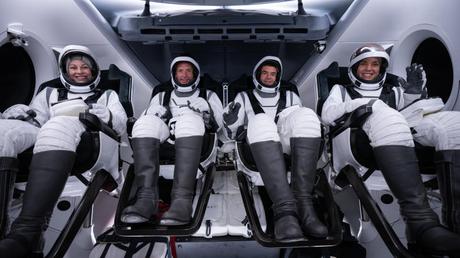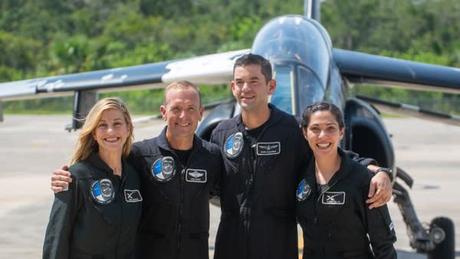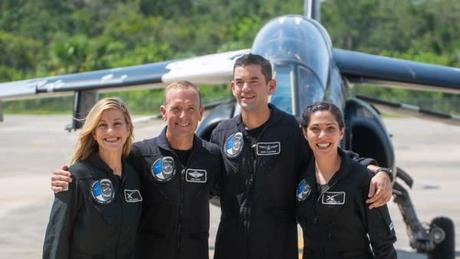
CAPE CANAVERAL, Fla. - The four astronauts on SpaceX's private mission Polaris Dawn, which will conduct the first commercial spacewalk, are not bothered by delays to their launch.
The mission was originally scheduled to launch on Aug. 27 but was pushed back to Aug. 28 due to technical issues. Polaris Dawn was then pushed back another two days, to no earlier than Friday, Aug. 30, due to concerns about weather at the end of the mission landing. Now the launch is contingent on the completion of a misstep investigation required by the Federal Aviation Administration, which grounded the Falcon 9 rocket after a failed attempt to land a booster at sea following a SpaceX Starlink launch early Wednesday.
Despite the many delays, the crew remains patient and focused on their mission. "Sometimes the toughest journeys require the most patience, and we are prepared to wait for the right moment. We know many traveled to see the launch, and we are grateful for your support," mission commander and funder Jared Isaacman wrote on X late Tuesday (Aug. 27).
Isaacman explained that the delays leading up to the start of the FAA's investigation into SpaceX's Falcon 9 failure were due to the nature of Polaris Dawn's unique mission.
"Our launch criteria are severely constrained by the predicted weather conditions for landing. With no ISS rendezvous and limited life support supplies, we need to be absolutely certain of the weather for reentry before we launch. Right now, conditions are not favorable tonight or tomorrow, so we will assess it day by day," Isaacman wrote in the message.
Other SpaceX crewed launches have almost exclusively flown to the International Space Station (ISS), where astronauts can stay for extended periods of time in the event of delays in their return plans. Because it doesn't travel to the ISS, the Polaris Dawn spacecraft must carry all of the crew's supplies for the duration of their mission. So bad weather at their return location means the launch is delayed to avoid stranding the crew in space without the food and supplies they might need.
Related: SpaceX postpones launch of Polaris Dawn astronaut until at least August 30 due to bad weather
Other crew members voiced their support for the delays on social media. "I always appreciate SpaceX's dedication and commitment to not fly until we are ready," mission specialist Anna Menon said in a post after Monday's delay.
"Great summary of where we are now. Weather is going to be challenging given the launch and reentry requirements," said Sarah Gillis, a Polaris Dawn mission specialist, in response to Isaacman's message. "We're still waiting for the next few launch opportunities, but we'll be ready as soon as there's a weather window!"
Polaris Dawn pilot Scott "Kidd" Poteet also joined in the online solidarity, saying, "It can be challenging at times as you prepare for race day, but we're going to proceed with caution and paranoia to make sure we mitigate the risk. In the grand scheme of things, the success of the mission will be all the sweeter for the entire Polaris program." [and] SpaceX team."
Even SpaceX CEO Elon Musk has weighed in on the discussion, given Polaris Dawn's audacious goals of conducting the world's first private spacewalk and the highest human spaceflight since NASA's Apollo missions.
"An incredible amount of work has gone into this historic mission by an incredible team," Musk wrote on August 26, after the previous delays. "We are triple-checking everything to make sure there is nothing more we can do to improve crew safety."


When the mission finally launches, Isaacman and his crew will spend five days in a highly elliptical orbit around Earth, higher than any human has flown since Apollo 17 in 1972. Polaris Dawn's astronauts will fly through portions of the radiation belts surrounding our planet and conduct nearly 40 experiments related to space exploration and the microgravity environment.
A major focus of the Polaris Dawn mission will be the completion of the first-ever private spacewalk. Clad in newly improved, thermally enhanced extravehicular activity (EVA) suits designed to protect the wearers from the harsh environment of space, the Polaris Dawn crew will ventilate their cabin to a vacuum and open Crew Dragon's top hatch to the void.
From the start of Dragon's cabin venting to repressurization, the entire spacewalk is expected to last two hours. The crew will focus on testing the functionality and maneuverability of SpaceX's new spacesuits, with Isaacman and Gillis taking turns emerging from the spacecraft's open hatch and also evaluating the handholds and mobility aids added to Dragon for this mission.
RELATED STORIES:
- How SpaceX's Polaris Dawn private astronauts will undertake the first-ever 'all-civilian' spacewalk
- How SpaceX Modified a Dragon Crew Capsule for Polaris Dawn's Historic Private Spacewalk
- Inspiration4: How Jared Isaacman's Kindergarten Space Dream Became a Groundbreaking SpaceX Mission
As of 2 p.m. EDT (4 p.m. GMT) on Thursday, August 29, neither SpaceX nor the FAA had provided an update on the investigation into the Falcon 9 accident. This replaces weather restrictions that initially delayed Wednesday and Thursday's launch windows.
Isaacman posted Thursday morning, however, that weather was the predictive factor for a launch decision. "I just need the weather forecast for landing to work with," he said, without mentioning the Falcon 9 grounding.
The crew of the Polaris Dawn remains patiently quarantined before the flight, depending on Mother Nature's mercy.
Update: Isaacman posted a longer update Thursday afternoon, saying that "the primary factor determining the timing of Polaris Dawn's launch is the weather at landing within the confines of Dragon." He added that the crew "is ready to launch within approximately 30 hours of receiving a favorable weather forecast."
